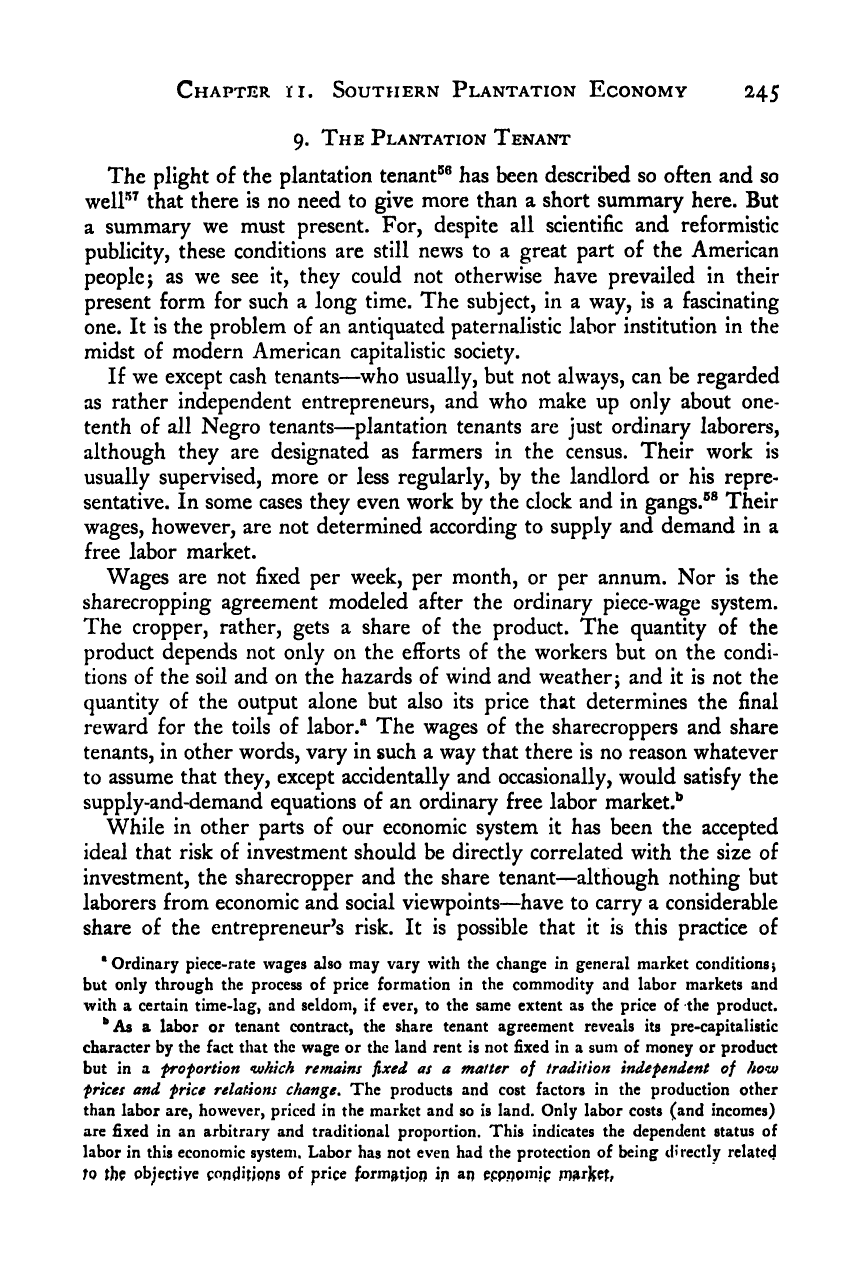Note: Gunnar Myrdal died in 1987, less than 70 years ago. Therefore, this work is protected by copyright, restricting your legal rights to reproduce it. However, you are welcome to view it on screen, as you do now. Read more about copyright.
Full resolution (TIFF) - On this page / på denna sida - IV. Economics - 11. The Southern Plantation Economy and the Negro Farmer - 9. The Plantation Tenant

<< prev. page << föreg. sida << >> nästa sida >> next page >>
Below is the raw OCR text
from the above scanned image.
Do you see an error? Proofread the page now!
Här nedan syns maskintolkade texten från faksimilbilden ovan.
Ser du något fel? Korrekturläs sidan nu!
This page has never been proofread. / Denna sida har aldrig korrekturlästs.
Chapter ri. Southern Plantation Economy 245
9. The Plantation Tenant
The plight of the plantation tenant®® has been described so often and so
well®^ that there is no need to give more than a short summary here. But
a summary we must present. For, despite all scientific and reformistic
publicity, these conditions are still news to a great part of the American
people j
as we see it, they could not otherwise have prevailed in their
present form for such a long time. The subject, in a way, is a fascinating
one. It is the problem of an antiquated paternalistic labor institution in the
midst of modern American capitalistic society.
If we except cash tenants—who usually, but not always, can be regarded
as rather independent entrepreneurs, and who make up only about one-
tenth of all Negro tenants—plantation tenants are just ordinary laborers,
although they are designated as farmers in the census. Their work is
usually supervised, more or less regularly, by the landlord or his repre-
sentative. In some cases they even work by the clock and in gangs.®® Their
wages, however, are not determined according to supply and demand in a
free labor market.
Wages are not fixed per week, per month, or per annum. Nor is the
sharecropping agreement modeled after the ordinary piece-wage system.
The cropper, rather, gets a share of the product. The quantity of the
product depends not only on the efforts of the workers but on the condi-
tions of the soil and on the hazards of wind and weather; and it is not the
quantity of the output alone but also its price that determines the final
reward for the toils of labor." The wages of the sharecroppers and share
tenants, in other words, vary in such a way that there is no reason whatever
to assume that they, except accidentally and occasionally, would satisfy the
supply-and-demand equations of an ordinary free labor market.’^
While in other parts of our economic system it has been the accepted
ideal that risk of investment should be directly correlated with the size of
investment, the sharecropper and the share tenant—although nothing but
laborers from economic and social viewpoints—have to carry a considerable
share of the entrepreneur’s risk. It is possible that it is this practice of
‘Ordinary piece-rate wages also may vary with the change in general market conditions
}
but only through the process of price formation in the commodity and labor markets and
with a certain time-lag, and seldom, if ever, to the same extent as the price of the product.
‘’As a labor or tenant contract, the share tenant agreement reveals its pre-capitalistic
character by the fact that the wage or the land rent is not fixed in a sum of money or product
but in a frofortion which remains fixed as a matter of tradition independent of how
prices and price relations change. The products and cost factors in the production other
than labor are, however, priced in the market and so is land. Only labor costs (and incomes)
are fixed in an arbitrary and traditional proportion. This indicates the dependent status of
labor in this economic system. Labor has not even had the protection of being directly related
to the objective conditions of price formation ip ap ecppojnip market,
<< prev. page << föreg. sida << >> nästa sida >> next page >>